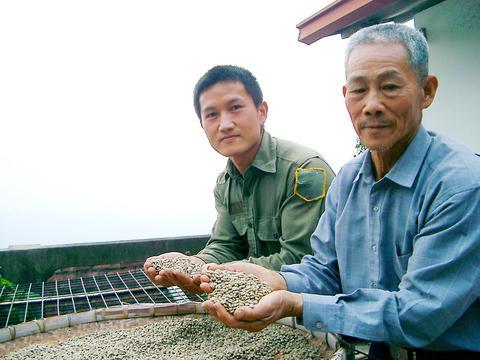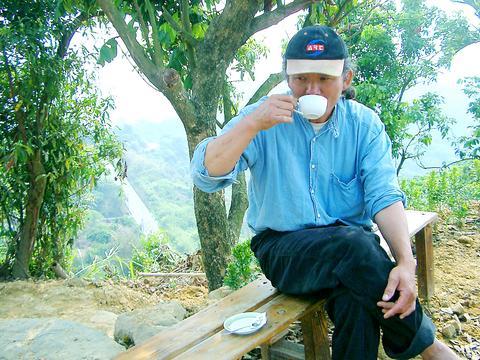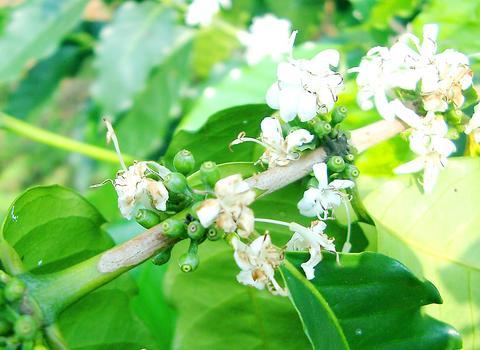Ten years ago in Tungshan township (東山鄉), a small town in Tainan County, drinking a cup of coffee was a luxurious treat for foreigners. Four generations of farmers in the town drank tea daily, like most Taiwanese, but now making, sipping and talking about coffee has become a daily routine for most residents.
They visit each other, exchange ideas about growing coffee trees and roasting methods and compare harvests with each other. As a result, this small town has gained a reputation for coffee that has attracted TV crews, writers and broadcasters alike.

Taiwan is well known for growing rice, tea and tropical fruit, but it also has a history of growing coffee for more than two centuries. Taiwan is in a subtropical zone -- similar weather to most coffee-growing countries -- and has mountainous areas in which coffee does well, thriving on the fluctuations of temperature found at high altitudes. Tungshan is a mountainous area 800m to 1200m above sea level and is one of four coffee-growing areas in Taiwan.

Kuo Ya-tsong (
business.

"Each coffee tree was grown by my hands," said Kuo Ya-tsong. His coffee farm and garden is called Ta Chu Hua Chien (

PHOTO: YU SEN-LUN, TAIPEI TIMES
The other three coffee-growing areas in Taiwan are: the Huisun Forest Farm (
Three areas all grow the Caffea Arabica plant. The are two stories regarding the origin of Taiwan's coffee growing. One says that 19th century British merchants brought some coffee plantlets from Manila and began growing coffee in northern Taiwan. Another story says the Japanese brought coffee to Taiwan in the early 20th century. The marketing of coffee was stopped because of World War II, when Taiwanese coffee farmers went back to rice-growing.
Now, because of Taiwan's fast-developing coffee drinking tendencies, coffee growing is back in business. "Tungshan is an interesting place because people who grow coffee don't usually have the habit of drinking coffee. But we do," said Shi Ling-lan, adding she and her husband are the "new immigrants within the island."
The couple used to work in the publishing business in Taipei. In 1991 they gave it up and went to the countryside looking for a new and rural life. The coffee in Ta Chu Hua Chien is not only organic, it is also roasted with innovative and precise roasting methods. Kuo's experienced hands have crafted a very smooth blend. Beside the coffee farm, the couple has also set up an "ecology classroom" which offers tourists a short walk around the mountain and aims to impart knowledge about local plants, snakes, eagles and pangolins. Shi occasionally offers classes to create handicrafts out of coffee.
The path around Kuo's garden is lined by cotton trees. The air is thick with the scents of coffee trees (similar to Jasmine) and lemon grass, which they grow beside the path. There are simply designed stones and wooden benches in the garden, with a nice view. Sitting down, sipping a cup of coffee, one can view the line of hills and the fishing harbor in Chiayi.
Originally Tungshan was better known for producing oranges and longans, but now dozens of households are growing the bean.
Tseng Ching-chiang (
As more farmers emerged in Tungshan, the Tseng's restarted their coffee farming. Their new coffee house has a distinctive Taiwanese style. The coffee beans are dried in a Chinese-style bamboo tray, one used to dry tea leaves. "We roast the coffee beans with woks," said Tseng Chien-nan.
He said his grandfather used to grind coffee with a Chinese mortar and pestle, the kind used for Chinese medicine. There is also an item on the menu called "coffee chicken." Tseng said it was a brick-kiln roasted chicken, but marinated in coffee dregs.
According to statistics from the Taiwan Coffee Association, Taiwan's coffee consumption is growing at a rate of 120 percent annually. There are roughly 10,000 cafes in Taiwan. As for the coffee chains, the biggest chain store, Starbucks has opened 110 branches and net profits of Starbucks in Taiwan is likely to reach NT$200 million this year.
"The younger generation are coffee drinkers and they have exceeded the tea-drinking people now," said Travis Lee, owner of Yeats Cafe in Taipei. He has been running his cafe for eight years and is increasingly facing tight competition, with six other cafes in just a small lane on Siping street.
Currently, according to the Agriculture Bureau of Tainan County Government, coffee farms in Tungshan township comprise an area of about 35 hectares, with 15 households growing coffee. The production amount is still too small (less than 500kg a year) to distribute nationwide.
Also, there is a quality-control problem. From the growing process, to roasting methods, there is plenty of room for improvement.
Shi Li-ling pointed out a common problem for Taiwanese farmers after the country joined the WTO. "The price of agricultural products has become very unstable and they're all very insecure about the future. So they tend to grow this and that altogether. But each farm is very small," Shi Li-lang said out. For example, on land of less than 1 hectare, oranges, longans, ginger and coffee was being grown.
Kuo and Shi's coffee farm is smaller than a hectare and does well to make ends meet. "Making a profit is not the main thing for us. What we are working for is a simple and natural lifestyle, hopefully it will come from our alternative coffee growing," Shi said.
The Tseng family said it was also willing to continue growing coffee. "If this does not make money, I at least hope to pass down my grandfather's tradition to my sons," Tseng said.

The 2018 nine-in-one local elections were a wild ride that no one saw coming. Entering that year, the Chinese Nationalist Party (KMT) was demoralized and in disarray — and fearing an existential crisis. By the end of the year, the party was riding high and swept most of the country in a landslide, including toppling the Democratic Progressive Party (DPP) in their Kaohsiung stronghold. Could something like that happen again on the DPP side in this year’s nine-in-one elections? The short answer is not exactly; the conditions were very specific. However, it does illustrate how swiftly every assumption early in an

Francis William White, an Englishman who late in the 1860s served as Commissioner of the Imperial Customs Service in Tainan, published the tale of a jaunt he took one winter in 1868: A visit to the interior of south Formosa (1870). White’s journey took him into the mountains, where he mused on the difficult terrain and the ease with which his little group could be ambushed in the crags and dense vegetation. At one point he stays at the house of a local near a stream on the border of indigenous territory: “Their matchlocks, which were kept in excellent order,

Jan. 19 to Jan. 25 In 1933, an all-star team of musicians and lyricists began shaping a new sound. The person who brought them together was Chen Chun-yu (陳君玉), head of Columbia Records’ arts department. Tasked with creating Taiwanese “pop music,” they released hit after hit that year, with Chen contributing lyrics to several of the songs himself. Many figures from that group, including composer Teng Yu-hsien (鄧雨賢), vocalist Chun-chun (純純, Sun-sun in Taiwanese) and lyricist Lee Lin-chiu (李臨秋) remain well-known today, particularly for the famous classic Longing for the Spring Breeze (望春風). Chen, however, is not a name

There is no question that Tyrannosaurus rex got big. In fact, this fearsome dinosaur may have been Earth’s most massive land predator of all time. But the question of how quickly T. rex achieved its maximum size has been a matter of debate. A new study examining bone tissue microstructure in the leg bones of 17 fossil specimens concludes that Tyrannosaurus took about 40 years to reach its maximum size of roughly 8 tons, some 15 years more than previously estimated. As part of the study, the researchers identified previously unknown growth marks in these bones that could be seen only